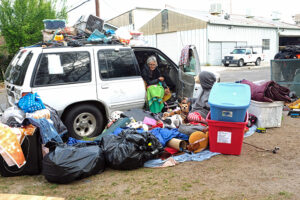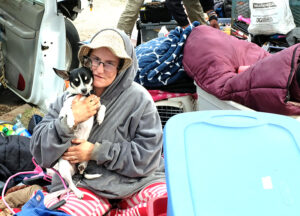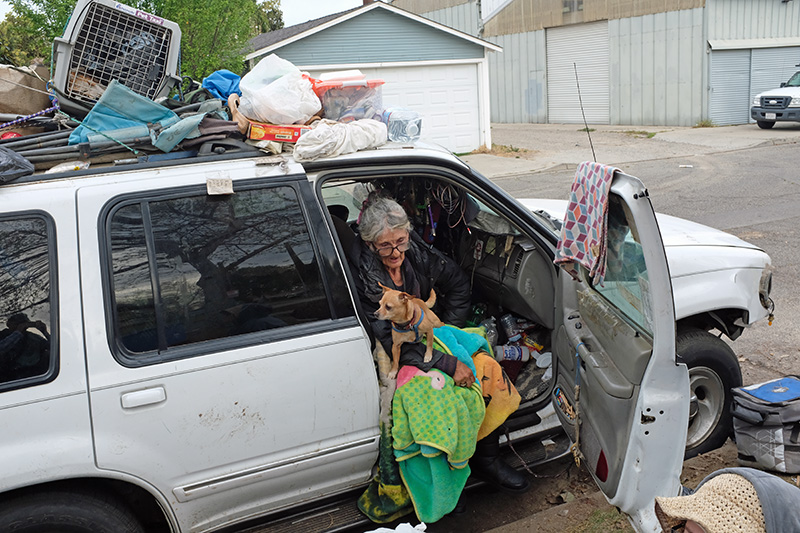 When Steve Finch and Frank Ploof founded Stanislaus Homeless Advocacy and Resource Enterprise* (SHARE) early last year, Ploof had already had almost ten years’ experience working to help people experiencing homelessness. Finch was new to the task, but thought his experience with Court Appointed Special Advocates (CASA), an organization that assists abused and needy children, would provide a model he and Ploof could apply to needy homeless people.
When Steve Finch and Frank Ploof founded Stanislaus Homeless Advocacy and Resource Enterprise* (SHARE) early last year, Ploof had already had almost ten years’ experience working to help people experiencing homelessness. Finch was new to the task, but thought his experience with Court Appointed Special Advocates (CASA), an organization that assists abused and needy children, would provide a model he and Ploof could apply to needy homeless people.
The CASA model features volunteers who become advocates for foster children or other needy kids. It’s been a successful program in large part because of the one-on-one relationships between the children and their advocates. Finch figured the model could work just as well with homeless people, with the difference that advocates for the homeless would expedite their move into housing. He still hasn’t gotten used to the hard realities of homelessness.
“If there were a dog in a park living like this, it would be a public scandal,” he said after visiting Cathy Heap in park in Turlock earlier this month. “We wouldn’t allow it.”
Heap has been living in vehicles, currently an aging SUV, off and on for at least five years. She and her late husband were among the early residents of Modesto’s Beard Brook Park when it opened for camping in 2018. That’s when Frank Ploof first encountered her.
“She and her husband were carnival workers before they retired,” said Ploof. “For a while they paid $600 a month to live in a garage without heat or electricity.”
Heap is a difficult case for several reasons, but one factor is her love for her dogs. She calls them her “fur babies” and refuses to abandon them. The number usually hovers around three or four, all of them tiny and vocal. Very few housing options for homeless people permit pets, and there’s usually a limit on the number of those that do.
At 68 years old and with a dependent daughter half her age, Heap clearly needs at least the barest essentials of food and shelter, including access to running water, a toilet, heat and light. When her husband was alive — he died last fall — their combined incomes were a little over $1700 a month. It was enough to keep a vehicle running, insured, registered and repaired — as long as the repairs weren’t major. Money left over went for food and other necessities. At today’s prices, rentals were out of the question.
Ploof has worked to find housing for Heap off and on since he met her at Beard Brook Park. She can be obstinate and, like many homeless people, can drop out of contact when forced to move from whatever curbside she’s occupied most recently. Finch picked up the case when she was found in the park in Turlock, where she’s been since September of last year.
“Her clothes were badly soiled and she wouldn’t get out of the car,” he said. “Apparently there are some decent Turlock police, because they’re at least permitting her to park instead of putting her in jail, but how can we allow this? Last time I was there, outreach workers from the county showed up, yet there’s nothing that can be done? She’s going to die out there.”
Since founding SHARE, Finch and Ploof have had a more than a few successes with difficult cases of homelessness. Using money from donations and a small grant, they’ve reunited homeless people with family members, found them housing, and, in one case, put an elderly man on a plane so his daughter could take him into her Oklahoma residence. Just recently, Ploof’s long experience with local nonprofits and other systems of care has enabled him to get three people off the streets and into housing; two of them had been homeless for over ten years.
 Nevertheless, both Ploof and Finch remained stunned at the sheer magnitude of the problem. While local authorities prate on about “accountability” and “family values,” more people become homeless almost daily — elderly people, disabled people, sick people, and working people — even while churches, charities and volunteer organizations exhaust resources, time, and energy in a losing battle against an ever-rising tide of fellow citizens with nowhere to go other than parks, sidewalks and road side camps.
Nevertheless, both Ploof and Finch remained stunned at the sheer magnitude of the problem. While local authorities prate on about “accountability” and “family values,” more people become homeless almost daily — elderly people, disabled people, sick people, and working people — even while churches, charities and volunteer organizations exhaust resources, time, and energy in a losing battle against an ever-rising tide of fellow citizens with nowhere to go other than parks, sidewalks and road side camps.
Far from atypical, Frank Ploof and Steve Finch represent the vast majority of the America public, who remain compassionate, generous and sympathetic to people in need. Unfortunately, today’s growing mass of extreme poverty is bigger than ever, just one stark consequence of decades of downsized government, privatized systems of care, and disengaged leaders, growing more and more accustomed to poverty in the midst of plenty.
*SHARE will show “Benevolent Neglect,” a film about homelessness, on May 26 at Modesto’s State Theater.


Well said, Eric Caine. I like your choice of words to describe leaders: “disengaged.” A disengaged employee is someone who usually doesn’t enjoy their work, and as a result, does the bare minimum, doesn’t put in extra effort, and is highly unlikely to be a government change agent. If that sounds bad, add that those who are actively disengaged are consciously causing problems within the government. Many of these steering committees that head up groups tasked with finding the solution to the problem of homelessness are merely pushing pencils and dead weight around at each and every such meeting.
The houseless individuals living out on the streets, somewhere and everywhere, are well aware of the negative effects disengagement can have on governmental team’s productivity, and their ability to maintain high morale at their governmental workplace and low morale spills out into the community. Even just one naysayer can create an environment more concerned with what’s going wrong than working towards government goals and the team’s greater well being. Since government leaders seldom, if at all, get out and about in their local community, to meet, talk, and experience what it is like for the houseless, it’s likely they are somewhat removed from the rumblings that may be going on beneath you.
So how do WE THE PEOPLE spot the symptoms of disengaged government employees and nip bad habits in the bud in order to rid ourselves of the negative culture, and put in place a dynamic proactive culture, before the effects of their attitude runs rampant and snowballs into something much bigger?
Sad to say, we missed that opportunity. Each and every time we fall for some seemingly enthusiastic campaigner telling us what we think we want to hear, we get stuck in the same old, same old perpetual vortex working to take us all down. Currently we, especially the houseless, are experiencing the rampant snowball growing larger, gathering up momentum, coming straight at us, here within the Modesto, and Stanislaus County government. I think it is not too outlandish to admit that the homeless community has already been bowled over by that runaway snowball and that snowball threatens to bowl over countless more, as the houseless numbers grow substantially.
The suggested remedy is to have “THAT” talk with the disengaged employee(s) to get to the root of the matter in order to nip things in the bud. BUT what happens when the disengaged employee(s) lack the skills to implement the projects that need completion to resolve the problems. Throwing money at some hairbrained scheme to make a speck of a difference, in the long run, is counterproductive and a big time waster. Last time I attended such a meeting, the leadership was going to contact other cities to learn what solutions they were applying. Indeed, why insist on continuing to reinvent the wheel? But that was 2015 or 2016, whereabouts. I know other cities have and are working on some innovative pilot projects instrumental in helping. Oakland has agreed the homeless are to manage their own encampments.
Our houseless citizens do not have time for counterproductive meetings that amount to zero long-time solutions for the masses. Stanislaus County and all of its incorporated and unincorporated areas need zoning changes, reduced regulations, and what ever else needs removal, which is currently creating barriers that obstruct developing safe harbors for LOW INCOME AND HOMELESS families. And in case anyone thinks I am not thinking about individuals, you would be wrong, individuals make up their own family just as much as two, three, four, five, six, seven, eight, nine, ten, or more people families do.
MAKE NO EXCUSE(S) there is not one legitimate reason why any and every task force to date has not succeeded in creating the changes necessary to house the houseless. How much room does it take to house every human being who needs it, with seven (7) walls: four (4) walls to enclose a bed, easy chairs or a loveseat, and a kitchenette, then three (3) additional walls to enclose a bathroom? Take a lesson from the RV and camper community or the tiny housing community, they are flocking to downsize and get out of the rat race that costs more money than few decent human beings have anymore. Stanislaus County, you no longer have a choice, or leisurely time to make up your minds, catch up with the trends. Have you ever taken time to visit with how Fresno has implement the planning department changes to legally set up Tiny Housing? Have you bothered to ask what the Houseless individuals would be more than glad to accept. Times they are a changing…
I would truly appreciate viewing “Benevolent Neglect.” Is there any possibility that it may be shown again, with a bit more lead time prior to its showing. I am disappointed that I probably cannot get there today, plus, I do not know the time. I will call the Modesto State Theater to see what I can find out.
Thank you to SHARE for thinking of this community, by making such a film about homelessness available.
We need to chip in and make more of these films open to others, with time after to meet, greet, and discuss. This is a way for all of us to come together in solidarity. I know these are not my ideas. SHARE has more than likely thought of this themselves, hence this “Benevolent Neglect” viewing today. I would not be surprised to find that there are some coffee, tea or church buildings that could donate their space to meet regularly for such a theme, and time as this. The Peace Life Center newspaper and The Valley Citizen could publicize the meetings so the group dynamic flourishes.
I been homeless for two years with my 6year old daughter who then was four at the time and it’s hard very hard. I’ve applied for the H.A.T. program and it’s been since January that I turned in all the required documents and still staying in the car. Any income I have I spend on at a motel for $100+ a night and that gets to expensive. They got funded 60 something million dollars for the homeless in stanislaus county but they haven’t helped me at all with it. They should at least give us hotel vouchers to use on a motel with it being that rate for one night which is ridiculous! It’s sad because my daughter will tell me all she wants is a house and I’m a single mother and it’s so it’s hard. What breaks my heart is when my daughter tells me she wants her pink room back and her home and she’ll come to me and tell me “mommy i prayed today for a new home” and it breaks my heart that i can’t give that to her rn. You know my daughter is only remembering a little bit about our home we use to have and only remembering about this time of her life of being homeless and I don’t want that to be memories she don’t forget.
Hi Vanessa. Send me a PM at [email protected] and let me know how to contact you. Frank
Lou:
Fortunately, “Benevolent Neglect” will show at the State Theatre MAY 26.
Let’s publicize it strongly. : )